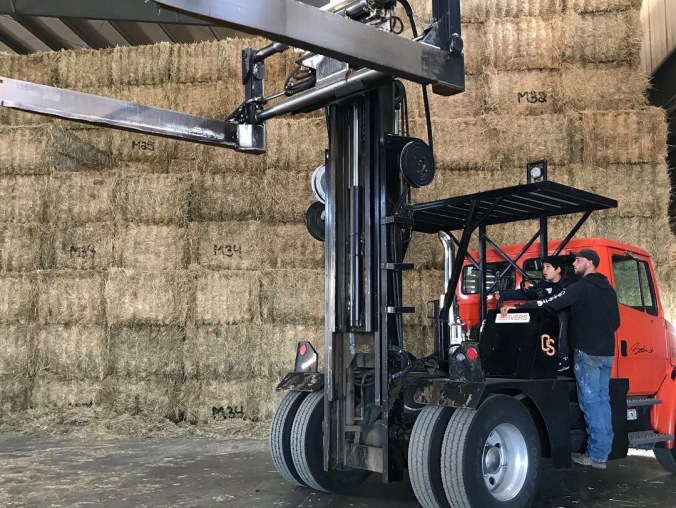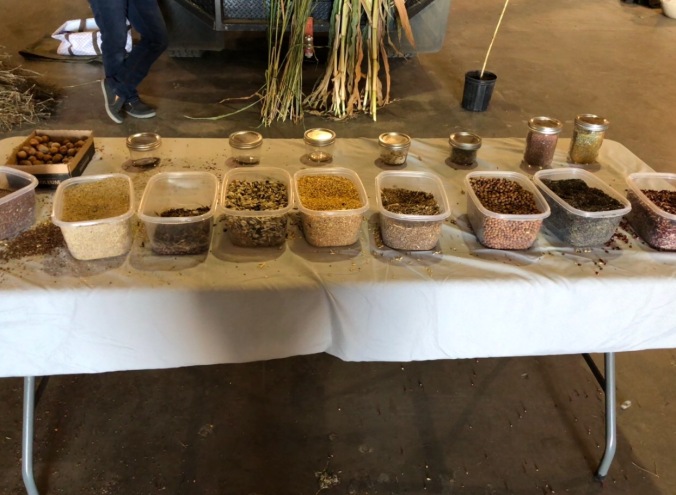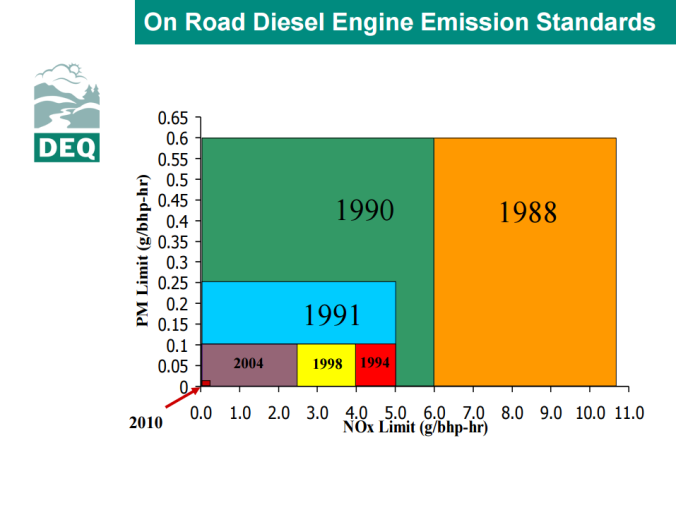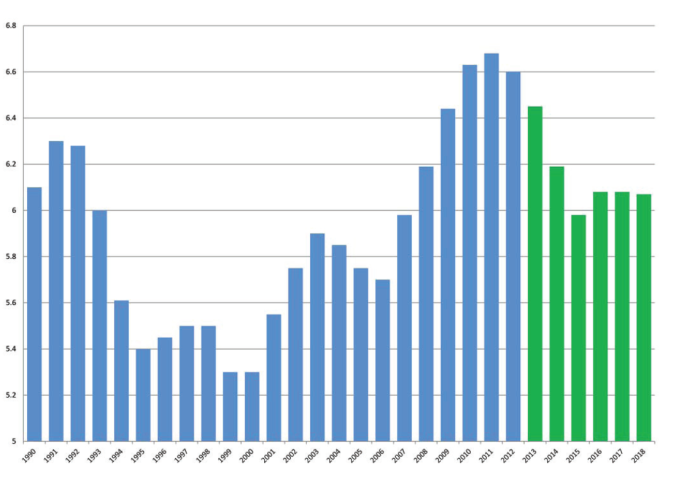One week ago, I had the opportunity to give the keynote address at the 2017 Dunn Carney Ag Summit with fellow agvocate and friend, Brenda Frketich. While there were some unintended laughs (see Brenda’s Nuttygrass blog here), the theme was certain: thank you for listening to our story, but what’s yours and are you willing to share it?

Telling my “Ag story”.

Brenda telling her “Ag story”.
Our hope is that we inspired people to share their story. The agricultural community needs more that do. If you’d like, please read the transcript of our keynote. We’d love to hear your story.
Keynote address follows… thanks for reading!
Shelly: Is that Brenda Frketich? Haven’t I seen you somewhere?
Brenda: Well maybe if you’ve had your TV on in the past few voting cycles…you know a lot of Trump, Hillary…and then there’s farmer Brenda talking about measure 97, a gross receipts sales tax, measure 92, GMO labeling, measure 84, repealing the Oregon estate tax…you get the drift here. My name is Brenda Frketich and I’m a third generation farmer from St. Paul. I grew up farming and after a short hiatus down in Los Angeles to get a business degree from Loyola Marymount University, I found myself wanting to get back on the farm. In 2006 my dad offered me a position as an intern, and I haven’t looked back. Today I am the owner operator of Kirsch Family Farms. I farm 1000 acres alongside my husband Matt, and a team of very dedicated employees. We farm a variety of crops including hazelnuts, grass seed, wheat, clover, vegetables and vegetable seeds. Beyond crops we are also raising a few kids, we have two sons, Hoot who is 2, and Davor who is 1. Up here with me today is Shelly Davis. Shelly, I feel like I see YOUR face everywhere.
Shelly: Sometimes it feels like that! Most likely you would have first seen it when I won America’s Farmers Farm Mom of the Year given by American Agri Women and Monsanto in 2015. Since then I started blogging, and have become more outspoken about the current situation of farming and transportation here in Oregon. I’m at the state capitol too much – as are you – and tend to be involved in different organizations. My name is Shelly Davis, and I’m a third generation farmer from Tangent. Along with two of my siblings, parents and close to 50 employees, we help manage about 1000 acres of grass seed, hazelnuts and wheat. We also run a 34 truck trucking operation hauling agricultural products and bale about 23,000 acres of grass straw that we compress, containerize, and export to Asia as feed for dairy and beef farms. My husband Geoff and I are raising 3 girls, 14, 11 and 9. He manages his family business and he’s a 3rd generation glazer. Running our separate family businesses and raising a family sure keeps us hopping. I mentioned I blog.. you blog too Brenda, called Nuttygrass. Where did you get that name?
Brenda: Well back in 2012 I was at a conference about how to be an advocate for our industry. I was talking about how I really enjoy writing and how I was already telling stories about farm life, mostly to many of my college friends who grew up in places like Southern California, pretty removed from the farm. A blog seemed like a great fit, and the speaker, agvocate in her own right, Michele Payn said, “Well you’re a nut and grass farmer, why not call it NuttyGrass?”, and here we are today. When I started it really was just as simple as telling stories and letting friends keep up with me on my farming adventures, but it has evolved into much more.
The content that I produce at times can seem fluffy, like just a cute photo, or something very non-controversial, but there are also times that I challenge my readers to take a step back and look at the bigger picture as to why we are really doing what we are to grow our crops. And that also requires me to take that step back and ask myself, “Why do we do this on our farm?”
From the beginning I decided that I was going to be transparent and that is what I have done. It’s not always pretty, I have posted some pretty sad and honest posts, but people need to hear that we aren’t just always standing in our fields smiling in the sunshine, there is a reality out there that needs to be understood. And on our farm it comes with spraying, it comes with pesticides, it comes with risk, losses of crops, and stress. But also it comes with a great life, hopefully a living, joy at what you can accomplish, and yes even some wins.
Shelly, your blog is called Daughter of a Trucker – doesn’t sound too farming focused, can you talk more about that?
Shelly: That’s a great question. Our friend Marie Bowers has had her blog since 2011 called Oregon Green and she writes mostly about farming, and you have your blog that also mostly talks about farming. I’ve always been extremely proud of my family’s trucking background on top of our farming history, and it turns out that trucking and transportation in Oregon needed a voice! I started Daughter of a Trucker literally days after the port slowdown started in November of 2014. I found that the general public didn’t know what was going on, and didn’t understand how international container shipping ports worked and why this was such a big problem.
I found my blog to be my voice.
In addition to transportation, I also write about our farm, happenings at the legislature, and items of concern in Oregon in general like the Owyhee Monument talks, which considering today is inauguration day and President Obama did not designate the Owyhee Canyonlands for a monument, I’m going to call that a win for the Natural Resource Community! I mentioned America’s Farmers Farm Mom earlier… Farm Mom is in it’s 8th year, it’s a national program that recognizes women who balances life at home and on the farm with a passion for community and agriculture. I was nominated by someone outside the agricultural and farming community and I would say that connecting with those outside the agricultural audience has been my biggest success in blogging.
I think that’s probably both a struggle and focus for all of us: reaching that outside audience. We can preach to the choir all day long, and I will continue to do that in order to inspire others to do the same, but our goal is to explain our story to those that don’t understand it.
I was absolutely inspired after meeting these other “Farm Mom” nominees from different parts of the country and learning about their struggles and their successes. There’s so many people I’ve met through the country that have literally said “There’s farming in Oregon?” Uh, ya, there is. It’s given me a platform to talk about farming that isn’t corn, soybeans and cotton. That of course is no offense to our new ODA director who has come from Iowa! But like she said, Oregon is diverse and that makes it exciting. It also makes it challenging. Farm Mom gave me the final prompting to get my voice out there as much as possible whether that’s radio, speaking, or blogging. You know, one thing I really struggle with is consistency. I’m more of a passion blogger – when something hits, I write about it. But, you are a consistent blogger, and I think that’s amazing. It takes quite a commitment doesn’t it?
Brenda: It does take a lot. Being consistent while connecting with all types of people is the balance that I try to achieve. I want those who, I like to say wear all kinds of shoes to find value in what I share. I say that because my non-farmer friends and I often joke about how different our lives are. While I am wearing muck boots out in a field many of them are wearing heels and working behind a computer everyday. Then some days we are just moms and have our tennis shoes on because quite frankly our kids are becoming increasingly faster than we are. I want to hit on all of that, on the life of a working woman, the life of a farmer, and the life of a mom.

Because of that I can go from posting a photo of my kiddos playing out in the field, to writing about GMO’s and people still come back to read even if they really only liked the photo of my kids. I want to bridge the gap that exists where people connect to me in one way but then assume things about my profession as a “farmer” and how I farm. I want my readers to know that yes, I’m a mom, yes, I go grocery shopping, yes, I have to make healthy food decisions for my family, of course, I don’t like the idea of being poisoned, of course I want to take care of the environment. Then I go to work as a farmer, and I take on the responsibility of growing safe & healthy food and of taking care of the land. I want people to see that regardless of the shoes that I wear throughout my day, none of my basic beliefs change. After I have gained their trust and some understanding, I can then hit on some of those bigger issues.
Shelly: What kind of bigger issues are you talking about?
Brenda: These days it seems like I get a lot of people sending me articles asking what I think about everything from GMO’s and pesticide, to water quality and organic farming. Many times I can use this as blog content, instance when a friend of ours, Anna Scharf, tagged us in a photo on Facebook about herbs at Fred Meyer that were labeled, “non-GMO”. We saw it as an opportunity to connect with our local grocers and let them know that there are actually no GMO herbs, so really there is no need to label them!
Or when people became unglued because there was a blog on why wheat is now toxic and is slowly killing all of us because we are all spraying it with Roundup right before harvest. I wrote on how we treat our wheat, when we spray roundup, and why it’s a good tool for us.
Those are just two examples. Shelly, what are some of the bigger issues you have covered in your advocacy work?
Shelly: It seems my pieces on the ports and labor slowdowns garnered a lot of national attention and led to being able to talk to big publications like The Economist and the Wall Street Journal. I say this not to ask for kudos but because it goes to show that what I know – what you know – is not only valuable, but the information that you and I might take for granted because we grew up doing it, is so necessary to be heard on a much greater stage. Oregon agriculture, our economy, and transportation both locally and internationally is more entwined than we thought, and now we’re realizing. It. You mentioned your response to the Toxic Wheat blog post. That blog that you wrote made it onto the Huffington Post, which is crazy! But, isn’t that what we want? Our story to be shared in hopes that it gives the outside world a different perspective, a farmers perspective.
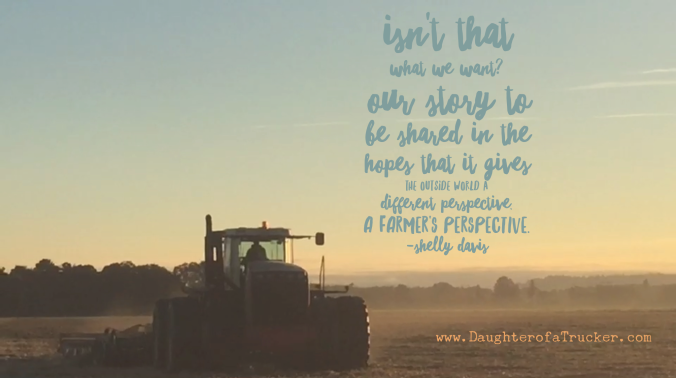
One thing I’ve noticed by putting myself out there… I’ve learned a lot. Because I need to know my stuff if I’m going to write about it! I’m sure you’re the same. Do you get contacted a lot because of your blogs and topics you write about or the fact that you’ve been a face to campaigns?
Brenda: I do get contacted pretty regularly for many different opportunities. And I often get asked how I was found, especially with some of the very public media campaigns I’ve been a part of. A large piece of that comes down simply to just being a good source for the media. Now I realize the media can be tricky because as much as we love to hate them, they are necessary and do play an important role in how we are viewed by the public. So if I’m contacted I always try to get a certain amount of information before answering any questions. Who are they, who do they work for, what is the story about, who else are they interviewing, what is their deadline. Then before I answer anything I pull up google and make sure this is someone I want to talk to. Make very sure that this article doesn’t have a chance to misinterpret myself, my farm, or agriculture as a whole. Obviously there will be mistakes that happen, I have been misquoted at times, but having those relationships is important. And being a good source does not go unnoticed.
Beyond media work however, I always take advantage of any outreach I can. For instance I try to take every opportunity to invite people to come and tour our farm. When I give presentations I never hesitate to mention that we have an open door policy at Kirsch Family Farms. I have given a fair amount of tours just because someone called me up, sometimes even years after they heard me speak, and asked to bring a group out to see what we are up to. I know Shelly does the same, and we extend that same invite to all of you here today.
Testifying at the legislature and having that type of involvement is no different. If you want to know what’s going on, if you want to have the opportunity, then join the organizations who support us. Not unlike the media looking for a good source, groups in agriculture are always looking for people to come and help support their efforts. Let people know you’re interested and they will come knocking at your door, at times almost knocking down your door to help them out.
The end result of this, thanks to social media and our level of connectivity in today’s world, we are all able to go beyond the one facebook meme, the one tweet about harvest, the one blog post about growing up on a farm and share online to extend agriculture’s reach. We want to be telling our story, we don’t want anyone else to do it, because they will inevitably get it wrong.
Shelly, what do you think? How do you feel about being contacted?
Shelly: You know the saying, “ignorance is bliss”, well it’s true. I wouldn’t say it bothers me. It’s kind of a love/hate relationship. I’ve also learned that I can say no if it doesn’t fit within my time that is needed for family and work. Recently I learned from Senator Betsy Johnson that you have to keep going and talk to both sides of the aisle, and to be that person your legislator knows they can go to for information. I’m always honored to be someone a person trusts for good information. And this cliché also rings true: “If I don’t do it, then who?” The farming community has an incredible story to tell and some are better storytellers than others. But that doesn’t mean that every story isn’t valuable, and like Brenda said, you are the best person at telling your story. The more voices that are out there, the stronger the farming, ranching and timber industries can be! If we doubled or tripled our presence on Social Media, in the Capitol, or in the newspaper, think how strong the Natural Resource Community can be!
I know there are a few college-age attendees here today, and possibly some younger or beginning farmers. To you, I want to speak directly and I say this to FFA and 4-H kids all the time. Join us, you are more than welcome to this big group called Agriculture. I want you to know that we are your biggest cheerleaders. We want you to try, knowing you will fail at times, but that we are here to help you along. Maybe it’s getting up in front to speak somewhere, maybe it’s trying to figure out what crop to plant next year, or it’s working towards your degree in vet medicine. Whatever it is, I believe you’ll find encouragement wherever you look in this community.
Brenda – Alright so…here’s a question that I know both Shelly and I hear all the time, “Shelly, what is it like being a women in ag?”
Shelly: Well, our friend Marie states it best: probably feels a lot like a man in Ag. Which is true, but I’d be remiss to not acknowledge some challenges. Those being children, trying to fit it all in, and not being the traditional face of a farmer. I would also suggest that being a woman in Ag is similar to being a woman in any traditionally male-dominated industry, namely trucking, military, construction and others. Our story isn’t that different than theirs. I’ve been known to say I’m always excited to see women in Ag do great things, but I look forward to the day it’s not a headline.

I read a blog called The Dirt this week and the author wrote about this topic, she says: “The conversation should no longer be about being a woman in ag. It’s about being in agriculture PERIOD.” Kudos to Oregon, but I think we’ve been at this point for a while now, and I’m incredibly grateful for that. I’m grateful for the hard working women that came before us and recognize that everyone has a different story. Mine is different than Brenda’s and our roles are different on our farms. But don’t you think Brenda, there are a many of us that have similar stories, and it typically starts with “my dad treated me like any other boy on the farm.” I can say that is true for me and my 3 sisters, and I have girlfriends that will say the same. Our former First Lady Michelle Obama has said: “Change happens when a father realizes the potential of his daughter.” I applaud the ag community for that. I also think that women have some natural traits that make us very valuable in the natural resource community – many of those are the same reason Farmer Brenda has been the face of campaigns, simply put, she’s a mom.
And Brenda, maybe you should point out the obvious?
Brenda: What? That there are two women up here right now?
It’s true, being a woman is different in many respects but many of our challenges aren’t because we’re women, they are because we are working in a state that continues to be so unfriendly to businesses.
Personally yes, I’m a mom, but I’m also a business owner. Not only am I the HR department, I’m the secretary, I’m the safety trainer, I am the tractor driver, sprayer operator. I’m who my employees come to when if they get hurt on the job, it’s my name on the operating line, but I’m also the one they come to when they need more toilet paper in the bathroom or pop in the pop machine. One of the biggest challenges I face to be honest, is wearing all those hats.
Legislators and agencies think it’s just one more form to fill out, one more thing to track such as unpaid sick time, or they say to me, “well there’s only three different ways we count employees in this state so that shouldn’t be so hard. Right?!” And maybe it’s not hard for that one thing, but it’s the one thing on top of a million things that is asked of us as employers here in Oregon. Not to mention that at times it also lacks the common sense that we have built our businesses on for generations. Which makes it an even tougher pill to swallow.
But then there is always the hat of being a mom that we have hit on already, and that just adds a whole other layer to the balancing act that Shelly and I sometimes struggle with, but have found that by working together, some days we can hit it out of the park!
Shelly: Remember the time you needed to speak to the legislature on behalf of Farm Bureau regarding pesticide usage a few years back? You were pregnant and Hoot was 1. You had no childcare that day, but knew how important it was to testify. I’m pretty sure Kathy Hadley and I took care of Hoot while you testified. You were tired, you were busy, and you needed help. But you did it because we all needed you to. And one of the reasons you were able to do it is because you had people supporting you and friends to help you out. The point is, advocating on behalf of the entire agriculture industry can be exhausting and take up too much time. You do it, I do it, we do it, because it benefits us, our farm, and even more importantly our future farm.

Brenda: Thank you Shelly for saying that – and as a woman, as a mom, as an advocate I would like to thank you all for your support. It’s truly an honor to be up here in front of an audience of farmers, those who are working in our industry, and those of you who support us day in and day out. Farming is not just a job but a way of life. It’s a way of life that is hard to explain, exhausting in its ability to encompass your whole outlook, and also rewarding as hell at the end of the day. I wish I could come up here after all of these speakers today and have Shelly and I list off the reasons why it’s going to be so easy to farm in Oregon moving forward, but business wise, I don’t think that is our reality. I think our fight is always just beginning, always changing, and always being challenged.
My story started with coming back to the farm after living in Los Angeles and getting a much different look at a life away from St. Paul, town of 322. It continued with my passion for an industry that seemed to the public to have a lack of transparency. And has continued to evolve as I became a mom, as I grew as a farmer and as a business woman.
So what is your story? To the farmers in the room today, as only 2% of the population, your life is a story within itself! Every day that you head out into your fields is an opportunity that you can use to do something as simple as taking a photo and sharing it. I can promise you, that photo of your everyday will look like heaven on earth to those folks stuck behind a desk browsing their facebook page. And for all of you who aren’t farmers, but I know work hard for our industry, you’re not off the hook. We need you to share our story, we need you to help us get our message across. We need your reach.
The challenges that we face sometimes seem to be incredibly daunting. But I also know that my grandpa, the first generation on our farm had challenges ahead of him every day that his feet hit the soil, as did my dad, and they were both resilient. My only hope, is for a future here, where my two boys as the fourth generation will have the opportunity to be just as dirty with the dust from our fields as I did. But we need an industry that is willing to work, not just for their own farm, but for their industry.
Shelly: I’m glad Brenda mentions her grandpa, because my story almost always includes my grandpa too on so many levels. My dad has said to me many times: “Shelly, Grandpa Merrill worked hard, I worked hard, and we just kept our heads down and kept to ourselves. We thought working hard was enough and that our elected officials and the community around us were grateful for our work and were like minded.” I’m standing here today to say that is not the case any longer. If my past generations had been more outspoken, would we be where we are today? I can’t say. But I do know this is where we are and I have a simple, yet great ask: Please – will you get involved? We need you. Every person out there – each and every one of you – has a passion for agriculture in some form, otherwise you wouldn’t be here.
You are smart, you are passionate, and we need you.
You might not want to speak in front of people, I get that. But maybe you can write a letter, maybe you can make a phone call, maybe you can join a local commission, a county farm bureau. Brenda and I know a lot about what we do, but Oregon Agriculture is so much bigger than that.
I have an action item for you: I want each and every one of you to do at least one thing that you didn’t do last year. Go to a county farm bureau meeting, go to the capitol and watch a public hearing with someone you know, submit testimony during the upcoming legislative session, read about the Adopt A Farmer program and maybe sign up for it!, join your local Oregon Women for Ag chapter, start a Twitter account and show your farm story – the opportunities are endless.
We both appreciate you listening to our story today, and our great hope is that it inspires you to tell yours.

